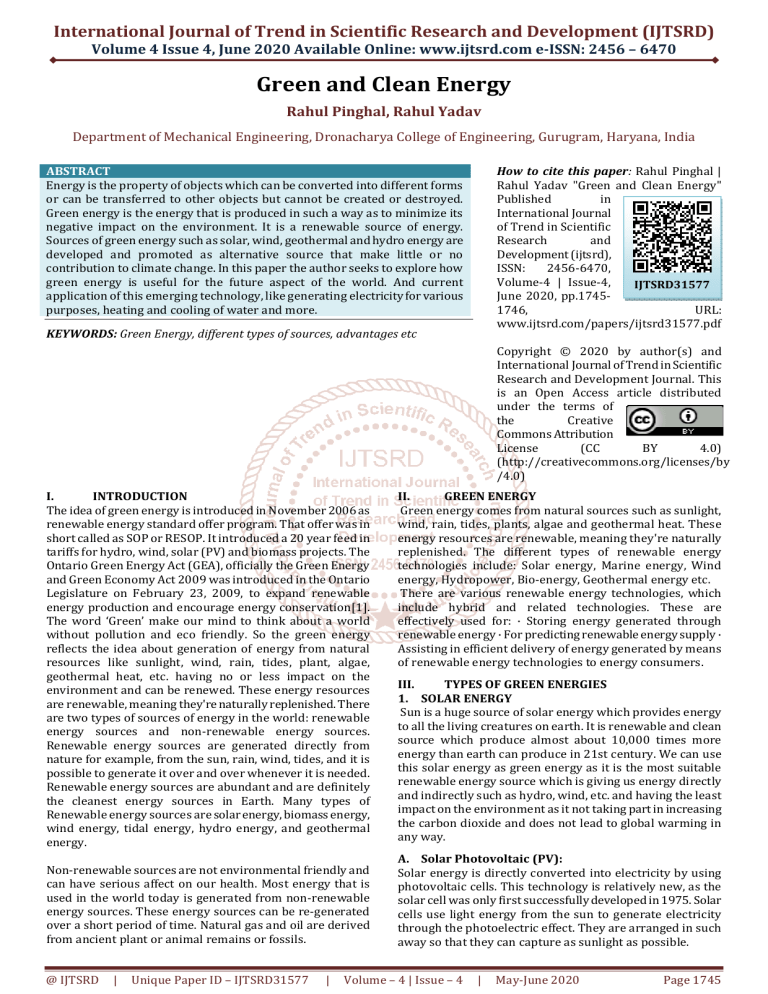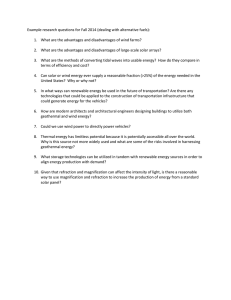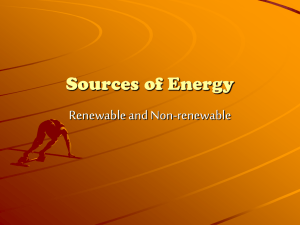
International Journal of Trend in Scientific Research and Development (IJTSRD) Volume 4 Issue 4, June 2020 Available Online: www.ijtsrd.com e-ISSN: 2456 – 6470 Green and Clean Energy Rahul Pinghal, Rahul Yadav Department of Mechanical Engineering, Dronacharya College of Engineering, Gurugram, Haryana, India How to cite this paper: Rahul Pinghal | Rahul Yadav "Green and Clean Energy" Published in International Journal of Trend in Scientific Research and Development (ijtsrd), ISSN: 2456-6470, Volume-4 | Issue-4, IJTSRD31577 June 2020, pp.17451746, URL: www.ijtsrd.com/papers/ijtsrd31577.pdf ABSTRACT Energy is the property of objects which can be converted into different forms or can be transferred to other objects but cannot be created or destroyed. Green energy is the energy that is produced in such a way as to minimize its negative impact on the environment. It is a renewable source of energy. Sources of green energy such as solar, wind, geothermal and hydro energy are developed and promoted as alternative source that make little or no contribution to climate change. In this paper the author seeks to explore how green energy is useful for the future aspect of the world. And current application of this emerging technology, like generating electricity for various purposes, heating and cooling of water and more. KEYWORDS: Green Energy, different types of sources, advantages etc Copyright © 2020 by author(s) and International Journal of Trend in Scientific Research and Development Journal. This is an Open Access article distributed under the terms of the Creative Commons Attribution License (CC BY 4.0) (http://creativecommons.org/licenses/by /4.0) I. INTRODUCTION The idea of green energy is introduced in November 2006 as renewable energy standard offer program. That offer was in short called as SOP or RESOP. It introduced a 20 year feed in tariffs for hydro, wind, solar (PV) and biomass projects. The Ontario Green Energy Act (GEA), officially the Green Energy and Green Economy Act 2009 was introduced in the Ontario Legislature on February 23, 2009, to expand renewable energy production and encourage energy conservation[1]. The word ‘Green’ make our mind to think about a world without pollution and eco friendly. So the green energy reflects the idea about generation of energy from natural resources like sunlight, wind, rain, tides, plant, algae, geothermal heat, etc. having no or less impact on the environment and can be renewed. These energy resources are renewable, meaning they're naturally replenished. There are two types of sources of energy in the world: renewable energy sources and non-renewable energy sources. Renewable energy sources are generated directly from nature for example, from the sun, rain, wind, tides, and it is possible to generate it over and over whenever it is needed. Renewable energy sources are abundant and are definitely the cleanest energy sources in Earth. Many types of Renewable energy sources are solar energy, biomass energy, wind energy, tidal energy, hydro energy, and geothermal energy. Non-renewable sources are not environmental friendly and can have serious affect on our health. Most energy that is used in the world today is generated from non-renewable energy sources. These energy sources can be re-generated over a short period of time. Natural gas and oil are derived from ancient plant or animal remains or fossils. @ IJTSRD | Unique Paper ID – IJTSRD31577 | II. GREEN ENERGY Green energy comes from natural sources such as sunlight, wind, rain, tides, plants, algae and geothermal heat. These energy resources are renewable, meaning they're naturally replenished. The different types of renewable energy technologies include: Solar energy, Marine energy, Wind energy, Hydropower, Bio-energy, Geothermal energy etc. There are various renewable energy technologies, which include hybrid and related technologies. These are effectively used for: · Storing energy generated through renewable energy · For predicting renewable energy supply · Assisting in efficient delivery of energy generated by means of renewable energy technologies to energy consumers. III. TYPES OF GREEN ENERGIES 1. SOLAR ENERGY Sun is a huge source of solar energy which provides energy to all the living creatures on earth. It is renewable and clean source which produce almost about 10,000 times more energy than earth can produce in 21st century. We can use this solar energy as green energy as it is the most suitable renewable energy source which is giving us energy directly and indirectly such as hydro, wind, etc. and having the least impact on the environment as it not taking part in increasing the carbon dioxide and does not lead to global warming in any way. A. Solar Photovoltaic (PV): Solar energy is directly converted into electricity by using photovoltaic cells. This technology is relatively new, as the solar cell was only first successfully developed in 1975. Solar cells use light energy from the sun to generate electricity through the photoelectric effect. They are arranged in such away so that they can capture as sunlight as possible. Volume – 4 | Issue – 4 | May-June 2020 Page 1745 International Journal of Trend in Scientific Research and Development (IJTSRD) @ www.ijtsrd.com eISSN: 2456-6470 2. HYDRO ENERGY Hydro energy is considered renewable because the energy from the sun powers the global hydrologic cycle. It is a power which is derived from water cycle, a continuous process of falling and fast running water to generate electricity. Hydroelectric power is an established form of renewable energy that already provides a major source of electricity, approximately 19% of the world’s electricity [5]. The majority of hydroelectric power harnessed in the world today is produced from large-scale schemes. In addition, there is further scope for development of smallscale hydroelectric projects since: A. Large scale schemes can produce hundreds of mega watts and also involve construction of large dams to provide a sufficient head to the turbine; B. Small scale schemes have less capacity and so have small dams and less impact on environment; C. Micro scale schemes produces power in kilowatt and are used in small villages and individual houses. 3. GEOTHERMAL ENERGY The term ‘geo’ means ‘the earth’ and ‘thermal’ means ‘the heat’ so geothermal means the energy which is generated in the form of heat which generates from the radioactive decay of materials inside the earth. It is the renewable and sustainable source of energy. The first geothermal power plant was built in Larderello. Magma which is produced from the radioactive decay of uranium and potassium below the earth crust produces lots of heat. The US National Renewable Energy Laboratory (NREL) found out that hot dry rock resources can provide about 4 million MW of capacity, which is more than all the electricity today US is using. If we compare geothermal in both the cases of size and consistency it can play an indispensible role in a cleaner, more sustainable power system. IV. ADVANTAGES OF GREEN ENERGY 1. SOLAR ENERGY It is a clean source of energy which does not produce harmful gases as a co-product so have no effect on environment and human health. Many everyday items such as calculator and other low power consuming devices can be powered by solar energy effectively. @ IJTSRD | Unique Paper ID – IJTSRD31577 | It is a better source of energy for future generation as it last long forever (infinite). 2. HYDRO ENERGY · It is one of the clean source of energy because does not create any by-product during conversion. Hydroelectric power is a domestic source of energy, allowing each state to produce their own energy without being reliant on international fuel sources. It is reliable, affordable and vast source of energy. · In addition to a sustainable fuel source, hydropower efforts produce a no. of benefits, such as flood control, irrigation and water supply. 3. GEOTHERMAL ENERGY: It is a cheaper and affordable source of energy used for bath, heating homes and offices, preparing food, etc. By using geothermal sources of energy present generations of human will not endanger the capability of future generation to use their old resources to the same amount. This is also cost effective, reliable, sustainable and environment friendly. Due to its low emissions geothermal energy is considered to have excellent potential for mitigation of global warming. V. CONCLUSION Through this paper we are trying to focus on need for energy which is eco- friendly and can be renewed which requires technological development to obtain the best utilization of green energy. As the resources obtained naturally has the potential to protect world and reduce dependence on nonrenewable resources which are near to extinction. VI. REFERENCES [1] https://en.wikipedia.org/wiki/Green_Energy_Act_200 9 [2] http://tec.gov.in/pdf/Studypaper/GET%20for%20Tel ecom%20A pplications.pdf [3] Source: https://shaikmohasin.wordpress.com/tag/troughsyste m/ Volume – 4 | Issue – 4 | May-June 2020 Page 1746



